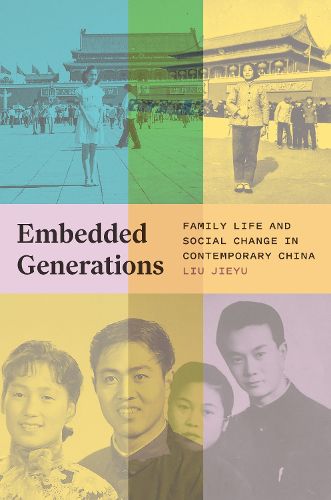Readings Newsletter
Become a Readings Member to make your shopping experience even easier.
Sign in or sign up for free!
You’re not far away from qualifying for FREE standard shipping within Australia
You’ve qualified for FREE standard shipping within Australia
The cart is loading…






An interconnected, nuanced, and nonlinear view of Chinese family life since 1949
With Embedded Generations, Liu Jieyu offers a comprehensive examination of Chinese family life since the Chinese Communist Revolution of 1949. Grounding her account in the analysis of 260 life history narratives and rich ethnographic data, Liu traces the changing ways families have navigated such experiential milestones as childhood, courtship and marriage, sex and intimacy, and aging over the past seven decades. Using generation, the urban-rural divide, and gender as her analytical lenses, she provides an alternative narrative of Chinese family life, countering the dominant Eurocentric accounts of modernization and family change.
Liu proposes the concept of "embedded generations" to capture the ongoing relational and socioeconomic shaping of family life, taking account of variation within and across generations, and of both intergenerational transmission and individual adaptations to changing conditions of everyday life. Resisting the notion that social and family changes are linear historical progressions, Liu reveals a family portrait of complex change, continuity, and diversity. Rather than a straightforward transition from the traditional to the modern and postmodern, she argues, changes in Chinese family life have entailed the adaptation and "re-serving" of traditional ideas and practices to produce a bricolage of modern and traditional elements.
$9.00 standard shipping within Australia
FREE standard shipping within Australia for orders over $100.00
Express & International shipping calculated at checkout
An interconnected, nuanced, and nonlinear view of Chinese family life since 1949
With Embedded Generations, Liu Jieyu offers a comprehensive examination of Chinese family life since the Chinese Communist Revolution of 1949. Grounding her account in the analysis of 260 life history narratives and rich ethnographic data, Liu traces the changing ways families have navigated such experiential milestones as childhood, courtship and marriage, sex and intimacy, and aging over the past seven decades. Using generation, the urban-rural divide, and gender as her analytical lenses, she provides an alternative narrative of Chinese family life, countering the dominant Eurocentric accounts of modernization and family change.
Liu proposes the concept of "embedded generations" to capture the ongoing relational and socioeconomic shaping of family life, taking account of variation within and across generations, and of both intergenerational transmission and individual adaptations to changing conditions of everyday life. Resisting the notion that social and family changes are linear historical progressions, Liu reveals a family portrait of complex change, continuity, and diversity. Rather than a straightforward transition from the traditional to the modern and postmodern, she argues, changes in Chinese family life have entailed the adaptation and "re-serving" of traditional ideas and practices to produce a bricolage of modern and traditional elements.